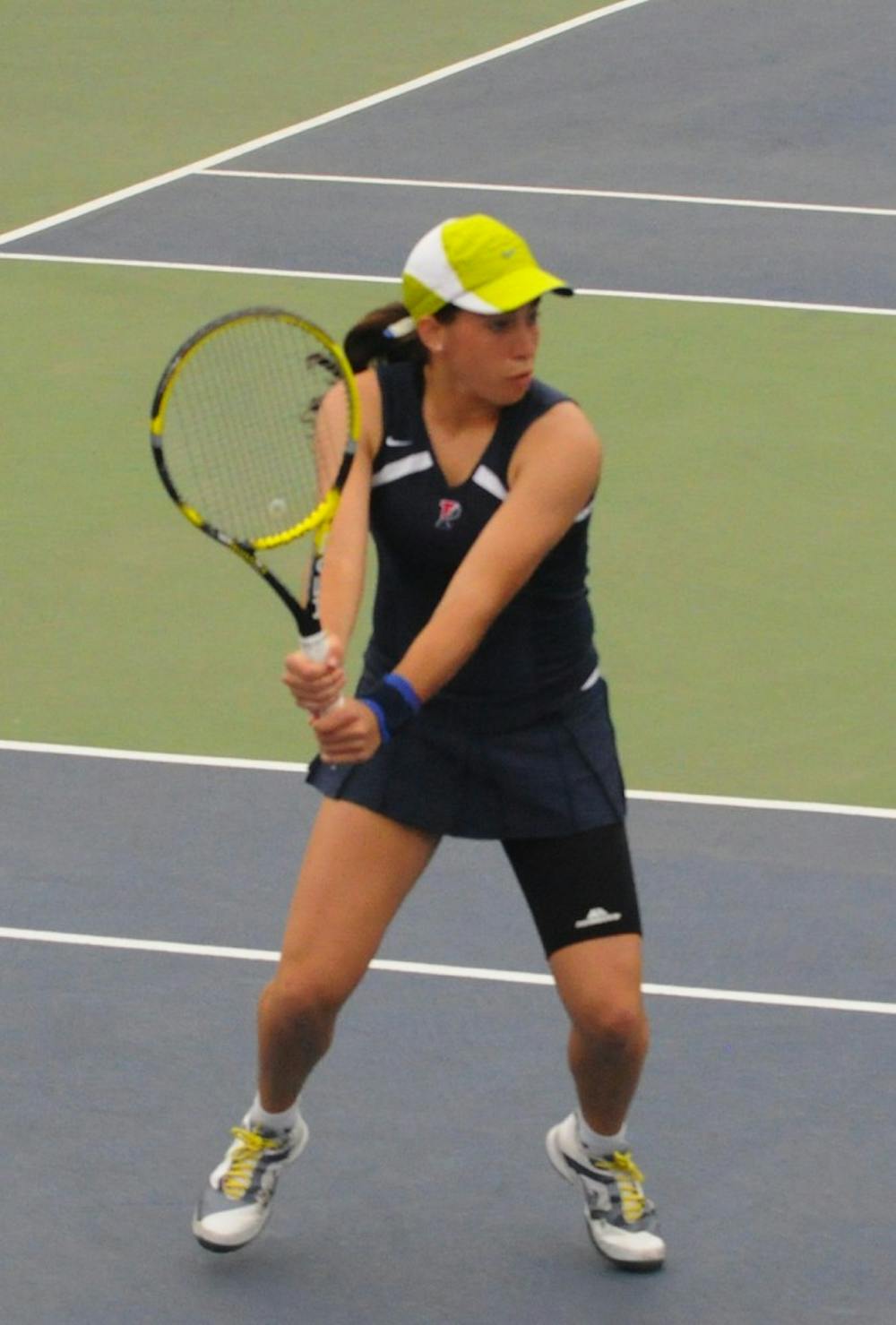
Though Sol Eskenazi and Alex Ion were both international recruits, their journeys to Penn were quite different.
As freshmen, both Eskenazi and Ion not only start, but lead the Penn women’s tennis team with eight wins each this spring.
Eskenazi, who hails from Buenos Aires, Argentina, was given the tall task of replacing now-pro Connie Hsu at No. 1 singles. Eskenazi has been almost perfect, losing just one match this spring.
Ion has been equally dominant for the Quakers this season. The Bucharest, Romania, native has only gotten better at No. 3 singles as the season’s gone on, winning five of her last six matches.
However, the two freshmen are even more impressive when considering how they got to Penn in the first place.
Eskenazi’s path to Penn began when she left her family in Argentina to train at the Mouratoglou Tennis Academy in France when she was 11.
She lived in France for three years before moving back to Buenos Aires. However, once she returned, she was constantly traveling to play in junior tournaments. “I didn’t see my family for like six months [at a time] and it was really hard,”
Eskenazi said.
But for her sacrifice, Eskenazi gained a reputation as one of the top young players in Argentina. She represented her country in the 2010 Junior Olympics and the 2009 Junior Fed Cup and competed in the 2010 Junior French Open and Junior Wimbledon.
At the time, Eskenazi was competing on the pro tour to build up her international ranking. However, she injured her left wrist in July 2010 and was unable to play on the tour for several months. To Eskenazi, the injury was somewhat of a relief. “I was quite tired of traveling a lot and competing,” she said.
Eskenazi had already been contacted by several college coaches and initially made Columbia her top choice. “I didn’t even know Penn at first,” she admitted.
However, after coming for a visit, she “fell in love with [Penn] and there was no other university that [she] wanted to go to.”
Compared to Eskenazi, Ion was a rather unheralded recruit.
Ion was unsure of what she wanted to do when she graduated high school and took a year off to play on the pro tour. Quickly, she realized that she was unlikely to make a living playing tennis and decided to pursue other options.
“I decided at that point that I really wanted to go to the U.S.,” Ion said. To help attract attention, she uploaded a video of herself playing tennis to YouTube.
She explained that her recruiting process was “mostly [her] reaching out to coaches,” as opposed to the other way around. “I felt like they were worried that I was an international player,” Ion said.
Ion was very excited when she spoke to Penn coach Sanela Kunovac.
“I heard a lot of good things about Penn,” Ion said, and decided to come to Philadelphia without going on an official visit.
Kunovac said deadlines prevented her from bringing in Ion for a visit, but she wasn’t worried about whether the Romanian would be a good addition to the team.
“In Alex’s case, it was so clear she’d fit right in,” Kunovac said. “As long as we got along in [phone] conversations, I knew she was going to like Penn.”
Eskenazi and Ion both cited Kunovac as one of the main reasons they decided to come to Penn.
“Sanela’s a great coach and that’s what convinced me,” Eskenazi said.
Kunovac, who was born in Bosnia, was an international player at Penn herself at and was named both Ivy League Rookie and Player of the Year in 2001.
Ion believes Kunovac’s background makes Penn more attractive to international recruits.
“I felt like she’s more open to recruiting international players and I felt like she understood me.”
Kunovac agrees that she is better able than some of her peers to recruit internationally.
“I think one of the edges I have is that I played in Europe, which means that I know a lot of coaches and I have contacts,” Kunovac said.
*** While both players acknowledge that the adjustment to America, Penn and college tennis has been hard, the freshman phenoms have thrived in their first year at Penn.
Arriving in Philadelphia in the fall was Ion’s first time in America and she found “a different mentality, a different way of thinking,” than in Romania.
Eskenazi agreed. “I was just all over the place and school was really difficult. I would say I am still trying to adapt to the United States.”
Both credit their teammates and Kunovac for making their transition easier.
“I think it really helped that I made friends through the team,” Ion said.
This year has been Ion’s first time playing on a team, so she’s had to learn to cheer for her teammates and adjust to team meetings.
“It’s a positive change,” Ion said. “Being part of a team definitely brings out the best in us.”
Eskenazi agrees that being on a team has been a great experience. “You’re playing for everyone, not just yourself,” she said. “I think that’s the biggest difference between professional tennis and [college tennis].”
Despite any language or cultural barriers, the two have forged close bonds with their teammates.
“In the end, I feel like tennis is universal,” Ion said. “It is its own language.”
Both Ion and Eskenazi have loved their American experience thus far, but have experienced some culture shock.
“I think [America has] everything,” Eskenazi said. “America is the perfect society in some ways.”
What do the two miss most from home? “Meat,” the freshmen said in unison.
“I guess here there is no meat,” Eskenazi said. “The first semester I think I had one steak, overall.”
Ion agreed, explaining that America has a “different food culture” than what she’s used to at home.
Beyond food, Ion and Eskenazi agree that the people here are different, but their individual cultural backgrounds lead them to different opinions as to why.
“People are more relaxed here,” said Ion in comparison to formerly Communist Romania. “They’re more optimistic. There’s not that much pressure.”
Eskenazi, who is from the more laid-back Argentina, whole-heartedly disagrees.
“Here, everything is really structured and in Argentina it’s not. I love that [about Argentina],” she said.
Kunovac believes “it might be easier” to be an international athlete at Penn now than when she was a student here 10 years ago.
“Communication is so different,” she said. “They’re so much more connected.”
Perhaps living in the age of Facebook and Skype as opposed to AOL and instant messenger makes it easier to make the transition to Penn as an international student.
Regardless of their backgrounds, Eskenazi and Ion have quickly broken into the starting lineup and made an impact on the Penn women’s tennis team.
That’s no simple task.
The Daily Pennsylvanian is an independent, student-run newspaper. Please consider making a donation to support the coverage that shapes the University. Your generosity ensures a future of strong journalism at Penn.
DonatePlease note All comments are eligible for publication in The Daily Pennsylvanian.







